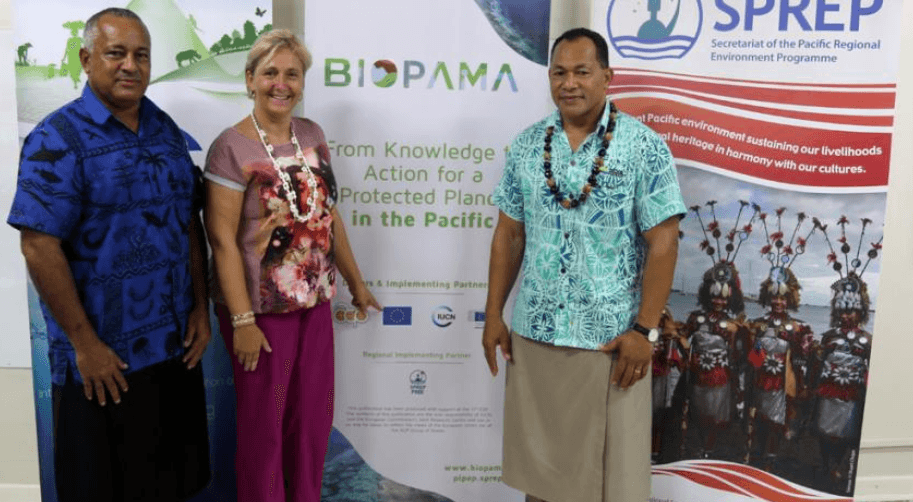Suva, Fiji, 7 February, 2018 (IUCN) – Pacific island countries are demonstrating global leadership in their actions to help halt the world’s biodiversity loss through the establishment of Protected Areas. These special areas on land, coastlines and open oceans have the added support of a significant regional project which is now entering its second phase – the Biodiversity and Protected Areas Management (BIOPAMA) Programme.
BIOPAMA aims to improve the long-term conservation and sustainable use of natural resources in African, Caribbean and Pacific (ACP) countries, in protected areas and surrounding communities. It is an initiative of the ACP Group of States financed by the European Union’s 11th European Development Fund (EDF), jointly implemented by the International Union for Conservation of Nature (IUCN) and the Joint Research Centre of the European Commission (JRC). In the Pacific region it is implemented in partnership by IUCN’s Oceania Regional Office (IUCN ORO) and the Secretariat of the Pacific Regional Environment Programme (SPREP).
Building on the first five years of activities financed by the 10th EDF, BIOPAMA’s second phase now progresses to 2023. The vital role information plays to bring about good decisions is recognised in BIOPAMA which provides tools for data and information management, services for improving the knowledge and capacity for protected area planning and decision making, and funding opportunities for specific site-based actions.
The partnership between IUCN ORO and SPREP has seen the enhancement of the Pacific Islands Protected Area Portal (PIPAP), the ‘one-stop shop’ for all information on Protected Areas maintained by SPREP with partners and Members. Through BIOPAMA, the JRC is also contributing essential technical support to the PIPAP. The PIPAP is the premier regional online resource for all Pacific island protected area information managed by SPREP and can be found at https://pipap.sprep.org/.
“We are pleased to be working closely with SPREP to improve the quality of baseline information for protected areas which is so necessary for their effective management and good governance and to help identify investment priorities” said Mr Mason Smith, IUCN Regional Director for Oceania.
“In addition to the work that SPREP will be delivering for BIOPAMA in the region, IUCN will be calling for proposals for small and large grants to support targeted actions associated with terrestrial, coastal and marine protected areas in priority locations in all fifteen Pacific ACP countries”.
In 2013, a State of Conservation report for Oceania highlighted that the thousands of rocky islets, coral atolls and volcanic islands of the Pacific region host exceptionally high numbers of plant and bird species found nowhere else on earth. However, islands and surrounding waters and their inhabitants have evolved in isolation and are naturally vulnerable to threats such as land clearing, over harvesting of natural resources, invasive species and rapid shifts in climate. Islands have had 80% of all known species extinctions in recent history. Any loss of biodiversity has negative effects on community wellbeing and livelihoods.
BIOPAMA provides strong support to the Protected Areas support programmes implemented by IUCN and SPREP. These programmes assist Pacific island countries achieve their commitments to saving the world’s biodiversity through the Convention on Biological Diversity Aichi Target 11, which calls for at least 17% of terrestrial and inland water areas and 10% of coastal and marine areas to be effectively conserved by 2020, and with some countries having established even higher national targets.
IUCN ORO and SPREP continue to build their enduring partnership commitment through the BIOPAMA programme and on related projects and obligations in conjunction with national governments, NGOs and other partners. “The BIOPAMA programme complements SPREP’s existing work on protected areas and will assist SPREP Pacific island member countries to meet their national protected area targets and improve their management of protected areas,” said Mr Kosi Latu, Director General of SPREP.
“Given the fundamental role that effectively managed protected area systems play in safeguarding native biodiversity and maintaining the ecosystem services that are needed for sustainable development, SPREP is proud to continue this important partnership with the IUCN, the EU and the ACP Group of States”.
A major BIOPAMA regional event is being planned for June 2018 in Apia, Samoa, to bring together a wide range of national representatives and organisations to collectively review protected area records, discuss ways to improve data and information sharing amongst key partners, identify challenges faced and gaps, and discuss grant making priorities. The workshop will also include hands-on capacity building in data gathering and acquisition, data management, creating spatial products and monitoring.
Related News

prev







